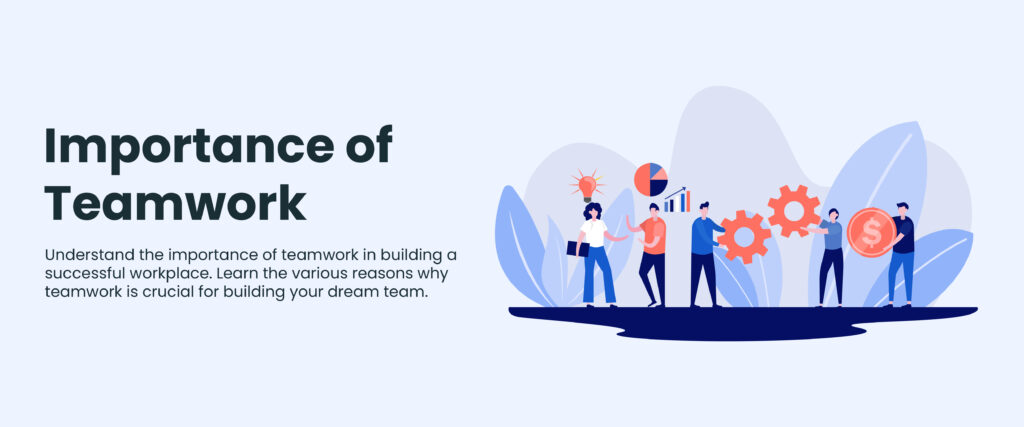The Importance of Teamwork: A Road to Collective Success

What do you imagine when you read the word “teamwork”? A group of people high-fiving each other, or perhaps a meeting room where teammates discuss goals and objectives together, or a vector image showing people holding hands in a circle. These imaginative visuals illustrate collaboration, partnership, coordination, synergy, cooperation, and many more qualities of teamwork. At any workplace, good teamwork is a prerequisite for achieving the desired targets and enhancing the quality of work. With this comprehensive blog, let us take a closer look at the importance of teamwork.
Understanding Teamwork
Teamwork means working together as a team. This act of working together is to achieve a shared goal or objective cooperatively. The analogy of cogs in a wheel applies to effective teamwork. Every team member’s role and expertise are essential for achieving great teamwork, just as each cog is required for the machine to run smoothly. Group members come together to complete a task or project by combining their expertise, knowledge, and experience. Teamwork also means encouraging cooperation, communication, and problem-solving among team members.
Why is Teamwork Necessary?
In a team, one gets the opportunity to lead others by example, which helps you develop leadership skills as well. In the workplace or anywhere else, it is difficult to share a common goal when members are disoriented and work individually without regard for unity. Some of the things that good teamwork offers are:
- Provides Dynamic Support – Any organization or business needs it because it enables teams to take advantage of the individual strengths of each team member, promotes collaboration, fosters communication, and makes problem-solving easier.
- Allows Each Team Member to Shine: In a team, every member is encouraged to do their best and make valuable contributions. By cooperating as a team, members can utilize their unique skills, knowledge, and experience to complete a common task or goal.
- Forges Bonds Among the Team Members: While working together to produce amazing results, team members often develop a friendly rapport and bond that eases stress at work, thereby increasing output and efficiency.
- Establishes a Healthy Work Environment: Among many benefits of teamwork is that it assists in establishing a productive workplace that is encouraging and motivating for employees.
15 Reasons Why Teamwork is Important in the Workplace
Employers post job openings to find the best and brightest candidates that will support their organization. These employees must embrace the spirit of collaboration to navigate the organization through unchartered territories and reach new heights. Here are some more instances that explain how teamwork becomes pivotal for the success of any organization.
- Encourages Innovative and Solution-Oriented Thinking
Often while accomplishing a task, a stumbling block may arise. What if a team member reaches a saturation point and cannot think of a way out? The team will not wait for one of its members to propose a solution alone but rather be supported by others to discuss and propose solutions. Collaborating with diverse team members fosters productive thinking that gives rise to a variety of ideas, sparking creativity and innovation that would not be possible through individual thinking alone.
- Exhibits Multipotentiality
Think about the scenario of a Finance Department team. There will be the Finance Officer, Finance Manager, Financial Analyst, Financial Adviser, Insurance Agent, Investment Manager, and more positions. Each of these people has a certain designation, role, and responsibility. Their combined expertise and multi-potential are what matter to achieving the effective running of the financial business of a company with the minimum disruptions. Teams comprised of individuals with varying strengths and expertise enable a comprehensive approach to problem-solving and decision-making.
- Respect Diverse Perspectives
During a monthly planning meeting or a meeting to discuss revamping the strategy to accomplish a task, team members will naturally offer diverse views and suggestions. Their various backgrounds and experiences regardless of their position, whether they are senior-level employees or those pursuing jobs for freshers, can help them approach problems from different angles, leading to more well-rounded solutions. When everyone feels respected and comfortable sharing their thoughts, it creates an environment of diversity and inclusion in the workplace.
- Promotes the Spirit of Conflict Resolution
There are bound to be disagreements when team members share their suggestions and viewpoints in a meeting or discussion. Maybe a team member wants to jump in with a different perspective while another is speaking. Although conflicts and disagreements are unavoidable, working in groups allows for the development of conflict resolution skills, which leads to improved relationships and better outcomes.
In a team meeting, for example, members can take turns explaining their perspectives and listening without interrupting one another. As a result, each team member can express their perspective fully, and a respectful and productive resolution can be reached.
- Facilitates Synergy and Smooth Communication
Greater synergy among team members is an extension of their unity of purpose. The best way to create synergy and smooth communication within a team is to have regular team meetings to discuss progress, set team goals and objectives, and create an efficient communication system. If your employees have part time jobs or work from home jobs it’s crucial to ensure that the team gets together every other week to interact.
For example, suppose a team of co-workers brainstorm ideas together and discuss their pros and cons. It leads to better results and more creative solutions by encouraging open communication and collaboration.
- Enables Achievement of Complex Goals
Teamwork is crucial when a task is too difficult for a single team member to accomplish alone. It allows for the pooling of resources, time, and knowledge to achieve challenging goals.
For instance, in web development jobs, the development and design of a website are the main and most complex tasks. A team of web developers, UX/UI designers, content developers, and creative writers can work together to create a website that meets the client’s requirements. This collaborative approach significantly improves the overall performance of the complex web development task.
- Enhances Efficiency and Promptness
Teamwork plays an important role in reducing the workload of a single person and helping to increase overall productivity as a team. It boosts efficiency in work by allowing members to divide tasks as they specialize in different areas. When members are certain of how they will contribute to a task or project, they are more likely to be prompt to work.
For example, in a research project, there are different research parameters as well as the need to write a report. The team can complete the task more quickly as a result of splitting up the work so that one person concentrates on research and another on writing the report.
- Provides Unwavering Support and Motivation
Over time, working in a team creates a sense of belonging. Warm and embracing support within a team also offers job satisfaction. There are both good and bad days at work. There can be a scenario when a co-worker finds it difficult to be productive on some days or someone feels stuck at some point. In such scenarios, teammates become moral boosters when there is already a cooperative spirit of teamwork. In trying times, they provide morale-boosting support and encouragement on an emotional level.
- Creates an Accommodating Work Environment
Even though the goals and objectives are discussed and decisions are taken, there might come a time when there are unforeseen changes and challenges along the way. When team members come together and pool resources and ideas to adapt to sudden changes in work scenarios, such a collective approach creates an accommodating work environment. Rather than allowing grudges to fester, everyone works with a challenging spirit and shared commitment.
- Offers Opportunities for Learning
Working in a team offers a wide range of learning outcomes. Along with personal development, the importance of team building lies in providing a free and open environment for an individual to learn. A person is allowed to share knowledge and skills based on previous work experiences whenever possible and necessary. Teamwork teaches the importance of collaborative efforts. Within a team, there are ample opportunities to learn new things just by observing and taking the initiative to ask for help in understanding the different perspectives and approaches.
- Ensures Collaborative Risk Management
The art of risk management comes with learning to work as part of a team. A sense of unity and purpose fosters a culture of collaborative risk management. It will require a team member to be proactive to help the team identify potential risks and contribute to devising a strategy to overcome the risks.
- Boosts Accountability and Ownership of Work
The team’s progress directly depends on how sincerely the individuals take ownership of their assigned work. Team members might be encouraged to work harder when they see their peers working hard and becoming accountable. Thus, one is more motivated to produce quality work and takes pride in excelling even more. As a result of this, increased sense of responsibility, individuals are also more creative and motivated to come up with innovative solutions.
- Fosters an Attitude of Shared Commitment and Responsibility
One of the many advantages of teamwork is that it allows co-workers to come together and fosters a sense of shared commitment and responsibility among them. In a team, each member is accountable for their assigned task and actions. When every member feels accountable, it naturally fosters a sense of shared commitment and responsibility for the mission’s success. A shared commitment among team members can also promote a feeling of unity and camaraderie, which promotes trust and cooperation.
- Brings Stupendous Success
It is an ideal team that encourages knowledge sharing, trains new hires enthusiastically, and helps each other acquire new skills. Such a team creates a thriving work culture where every member works productively and produces higher quality output, leading to the fantastic success of every target. This also ensures the organization’s continued growth over time.
- Leads to Networking Opportunities
Building a positive reputation around work and communication with others through good conduct and behavior fosters interpersonal connections, good bonds, and professional contacts. This may lead to future opportunities and collaboration. Working in teams offers individuals the chance to connect with professionals in their field, gain industry insights, and develop contacts with professionals looking for job vacancies.
Conclusion
The importance of teamwork for personal and professional triumph cannot be overstated. It combines diverse abilities, viewpoints, and efforts to achieve common objectives. Striving to be a good team member can help you become a great leader. Take a step towards uniting with your team members and advancing in your professional life.



